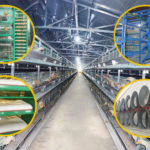For poultry farmers aiming to scale up production, a 20,000-layer chicken farm requires careful planning, efficient housing, and reliable equipment. Traditional open housing cannot meet the demands of large-scale egg production, which is why more farmers are adopting the battery cage system.
This solution outlines how to design and operate a 20,000-layer chicken farming project using modern H-type battery cages, supported by automation for feeding, manure removal, egg collection, and environmental control.

Farm Design Overview
A farm with 20,000 layers is classified as a medium-scale commercial poultry project. To maximize space utilization and productivity, the farm is designed with H-type layer cages.
- Number of layers: 20,000 birds
- Cage system: H-type battery cages, 4–5 tiers
- Total sets of cages: approx. 140–160 sets
- House size: ~70–75m length × 12–13m width per house
- Housing material: steel frame with proper insulation
Core Equipment in the Solution
1. Layer Battery Cages
- Hot-dip galvanized steel for 20+ years durability
- Fitted with nipple drinkers and feed troughs
- Sloped design for smooth egg collection
- High bird density without compromising comfort
2. Automatic Feeding System
- Central silo and feed auger line
- Automatic trolleys distribute feed uniformly
- Reduces labor cost and feed waste
3. Egg Collection System
- Conveyor belts carry eggs from each cage row
- Central egg elevator connects to grading and packing area
- Reduces cracked eggs and saves time
4. Manure Removal System
- Belt system under each tier
- Daily manure discharge outside the house
- Cleaner environment, fewer flies, reduced disease risk
5. Ventilation and Climate Control
- Exhaust fans and cooling pads for stable airflow
- Smart controllers adjust temperature and humidity automatically
- Protects birds from heat stress in warm climates

Daily Feeding & Egg Production Estimates
- Feed intake per bird: ~115–120g/day
- Total daily feed: ~2.3–2.4 tons for 20,000 hens
- Egg production rate: 90–95% at peak
- Daily output: 18,000–19,000 eggs
- Annual output: ~6.5 million eggs
Investment and Returns
- Initial cost: includes cages, housing, automation, installation
- Labor reduction: automation cuts workforce by 60–70%
- Return on investment: typically 1.5–2 years, depending on feed and egg market prices
- Profitability: stable and predictable due to steady egg demand
Advantages of the 20,000-Layer Battery Cage Solution
- Efficient land use: H-type cages stack vertically to house more birds in less space
- Improved hygiene: automatic manure removal reduces ammonia buildup
- Higher productivity: optimized feed and water management ensures peak laying rates
- Better egg quality: reduced breakage during collection and handling
- Durability: cages built to withstand intensive commercial use

Why Choose a Professional Supplier
For a farm of this scale, choosing the right poultry equipment manufacturer is essential. A trusted supplier provides:
- Customized farm design
- High-quality battery cages
- Full automation package
- Installation guidance and after-sales service
Conclusion
A 20,000-layer chicken farming battery cage system solution is the ideal setup for medium-scale commercial egg producers. With H-type cages and modern automation, farmers can achieve higher productivity, reduce costs, and improve egg quality, ensuring a sustainable and profitable poultry business.
Contact our team today for a customized quotation and farm design tailored to your location and production goals.






